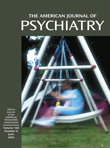Mental Disorders Among Military Personnel
To the Editor: We greatly enjoyed the article by Charles W. Hoge, M.D., et al. (1). They made excellent points on mental illness and mental health care in the military. Our one concern was a possible underreporting of outpatient substance abuse. Data collection systems for patient encounters in military outpatient settings challenge providers in keeping accurate accounts of client diagnosis or even encounters. As part of a quality-improvement program at military mental health clinics, 1 year’s worth of charts (for nearly 900 individual patients) were reviewed for diagnosis, health care use, comorbid substance use disorders, severity of illness, and health care use. We generally agreed with the findings of the authors but note that our rate of substance use disorders, specifically alcohol abuse and dependence, was much higher and closer to 50% for all 900 clients. Other published studies have also reported fairly high rates (2, 3). This did not take into account the local drug and alcohol clinic’s population, which the authors presumably included in their analysis. Our mental health clinic and drug and alcohol clinic, in which this quality assurance project was conducted, did not consistently use the collection systems referred to in the article until 1999 or later. It is likely that other clinics did not use the data systems accurately as well. Oftentimes providers code for only for one diagnosis (e.g., depressive or adjustment disorder); hence, substance use disorder is not recorded. We would be interested in the authors’ comments on these issues and thoughts for future study.
The views expressed in this manuscript are those of the authors and do not reflect the official policy or position of the Department of the Army, the Department of Defense, or the U.S. government.
1. Hoge CW, Lesikar SE, Guevara R, Lange J, Brundage JF, Enge CC Jr, Messer SC, Orman DT: Mental disorders among US military personnel in the 1990s: association with high levels of health care utilization and early military attrition. Am J Psychiatry 2002; 159:1576-1583Link, Google Scholar
2. Caetano R, Cunradi C: Alcohol dependence: a public health perspective. Addiction 2002; 97:633-645Crossref, Medline, Google Scholar
3. Miller BE, Miller MN, Verhegge R, Linville HH, Pumariega AJ: Alcohol misuse among college athletes: self-medication for psychiatric symptoms? J Drug Educ 2002; 32:41-52Crossref, Medline, Google Scholar



